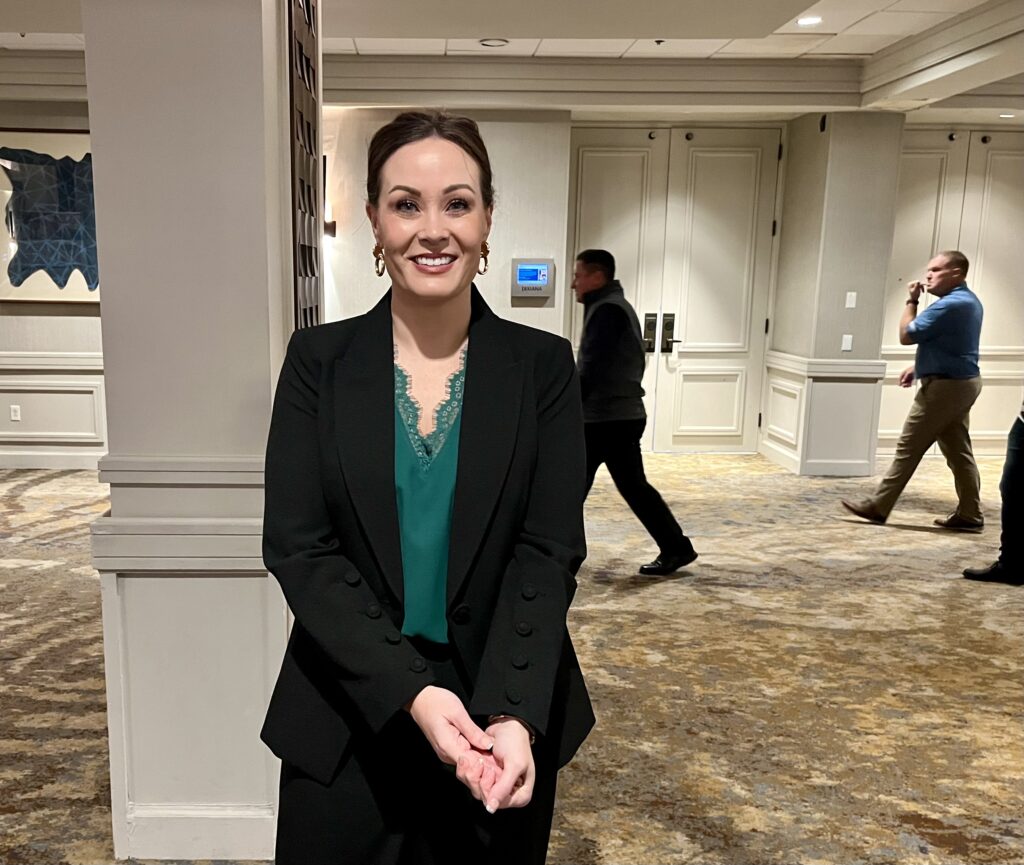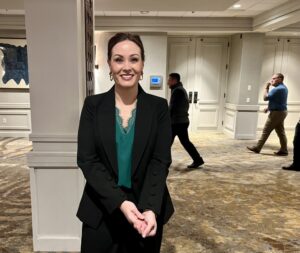Lawmakers, advocates talk maternal health, AI, gun violence and more at Lexington conference

By Sarah Ladd
Kentucky Lantern
A bipartisan panel of Kentucky lawmakers told dozens of health advocates Tuesday they plan to introduce a variety of bills in 2025 to collect gun violence data, restore abortion access, regulate artificial intelligence, reform prior authorization and more.
They spoke at the Kentucky Voices for Health’s annual meeting at the Griffin Gate Marriott in Lexington, which convened to discuss policy gaps and ideas to address the state’s poorest health outcomes.
The General Assembly, which has a Republican supermajority, convenes for a 30-day session on Jan. 7. Lawmakers will meet for four days, then break until Feb. 4. During that initial four days, hundreds of bills will get filed, members of the panel said.
Other priorities include implementing paid family leave for state workers, making housing more affordable and accessible and more.
‘Healthy children require healthy mothers’

Guest speaker Lt. Gov. Jacqueline Coleman kicked off the day-long meeting by asserting: “Health care is a basic human right” and “mental health care is health care.”
The Beshear administration focuses a lot on economic development, which Coleman praised in her speech, connecting it to overall health.
“We’ve broken every economic development record on the books every single year since we’ve been elected,” she said. “But here’s what we know…I always say this, too, about education, because I was a teacher … the future of Kentucky’s economy is in our classrooms today, but we have no future economy if we don’t have a healthy workforce.”
After her welcoming address, Coleman told the Lantern that she’d like to see lawmakers in 2025 focus on improving mental health for Kentucky’s youth and finding ways to support mothers in the period after giving birth.
“Healthy children require healthy mothers,” she told the Lantern. “And to really put that continuum together is something we have to prioritize.”
Care for mothers has to start by caring for them as women and people first, Coleman said. She said the administration has “some really, really exciting news coming” on that front soon, but didn’t provide details.
A panel of maternal health experts echoed Coleman during an afternoon panel, saying that Kentucky mothers need special insurance coverage periods that extend at least two years postpartum, more providers who look like them, freestanding birth centers, more doulas embedded in birth teams, and more.
Kentucky got a “D-” grade from March of Dimes this year in a ranking based on several maternal health factors. That report found chronic health problems led to too many preterm births, among other things. Most of Kentucky’s maternal deaths are preventable, according to a 2023 report from the Cabinet for Health and Family Services.
What to expect from lawmakers, advocates in 2025

During an afternoon panel, Sen. Amanda Mays-Bledsoe, R-Lexington, said she wants to file either a bill or multiple bills to address the “new spaces” of artificial intelligence (AI).
Mays-Bledsoe, who co-chaired the interim Artificial Intelligence Task Force, said the group gave her the chance to look “at the ethics of AI — how do we use it, where is it appropriate, how are we defining it?”
“I’ve learned so much in this space — some of it’s terrifying, some of it’s extremely exciting,” she said.
One item she wants to introduce next session is a “regulatory framework of how the state is going to use AI.”
Rep. and Sen.-Elect Keturah Herron, D-Louisville, said she will once again introduce legislation to establish an Office of Gun Violence Prevention, which would collect data on gun violence in the state, including data on domestic violence and suicide. The National Suicide Prevention Lifeline is 988.
“When we talk about gun violence, it’s a very complex issue. It can be a very divisive issue,” Herron said. “But one of the things that I know that is true is that no matter where you are in the commonwealth, you will and can be impacted by gun violence.”
Sheila Schuster, the executive director of the Kentucky Mental Health Coalition and a longtime health advocate in Frankfort, moderated the lawmaker panel.
“I just want to emphasize, as a psychologist, the importance of keeping guns locked away,” she said. “What happens is that if someone is caught up in a suicidal downward spiral and has that impulse, if there is a firearm available, the chances are … more likely that they are going to successfully complete that suicide.”
Herron also wants to introduce legislation on juvenile justice, which she has also done in the past, and on youth mental health.
Rep. Lindsey Burke, D-Lexington, plans to once again introduce legislation on reproductive health issues. For the past two years, she’s filed unsuccessful bills to restore the abortion access that Kentuckians lost when a “trigger law” went into effect after the United States Supreme Court overturned the constitutional right to abortion in 2022.
That same year, Kentucky voters rejected an anti-abortion amendment that would have stated definitely that there is no right to an abortion in Kentucky’s Constitution.
Kentucky does not have exceptions for rape or incest, though both Republican and Democratic lawmakers have filed unsuccessful bills to change that in recent years. There is an exception in cases where the life of the pregnant person is at risk.
Lawyers for the American Civil Liberties Union (ACLU) and others have argued to no avail that the restrictions Kentucky has in place are unconstitutional.
“We need to make sure that women have access when they need it,” said Burke, who had a complicated journey to motherhood, including infertility and in vitro fertilization (IVF). “Beyond that, I want women to be happy and healthy after they have a baby.”
Rep. Derek Lewis, R-London, said he expects to primarily file regulation fixes, including making sure sign language interpreters stay in K-12 schools. He also wants to draft a “dementia training bill” for the Department of Community Based Services.
Rep. Michael Meredith, R-Oakland, said he believes lawmakers are “getting pretty close” to passing prior authorization reform. Prior authorization requires a physician to get permission from a health insurance company before scheduling a medical procedure or treatment or else it will not pay for the cost. Advocates for reform have said it can delay care.
“I don’t know exactly who the bill sponsor is going to be yet,” Meredith said. “It’s not finished up just yet. But we spent a lot of time during this interim marshaling toward a solution on that.”
Meanwhile, Kentucky Voices for Health will prioritize advocating for the following policy points, among others, during the 2025 sessions: Allow Medicaid to cover midwives and doulas. Establish an All Payers Claims Database to create an “apples-to-apples comparison” of claims across health care systems. Exempt freestanding birth centers from the Certificate of Need requirement. (For more on this ongoing issue, read this.) Expand the Public Health Dental Hygienists network to ensure more dental providers throughout Kentucky and address the state’s poor oral health.
On DEI
An audience member asked the panel if lawmakers would again introduce legislation to roll back some DEI (diversity, equity and inclusion) programs and offices. Efforts to ban such programs at public higher education institutions failed during the 2024 session.
“I’m not carrying it,” Lewis said, though he added there had been some “discussions” in both chambers about how such legislation might look.
Herron, who will be moving to the Senate in 2025 and will be the chamber’s only Black woman, said she expects to see the bill again.
“We need to be doing things that’s making our state stronger, not weaker,” she said. “It’s my belief that anything that we’re doing that is rolling back diversity, equity and inclusion is only making our commonwealth weaker. It is setting the tone and letting people know that they’re not cared for in this state, that they are not seen in this state.”